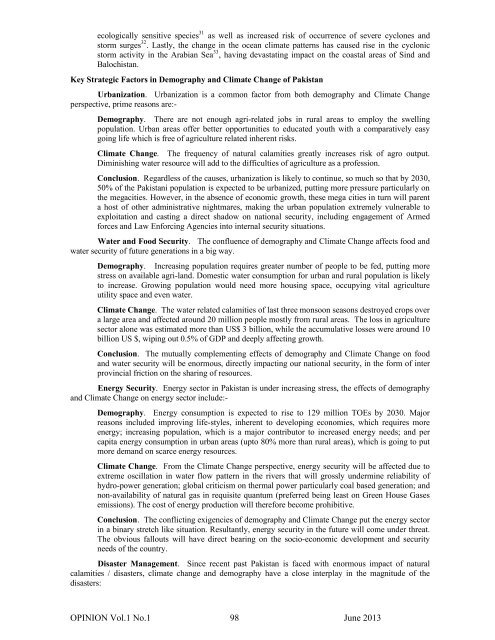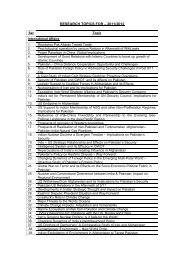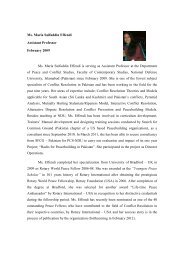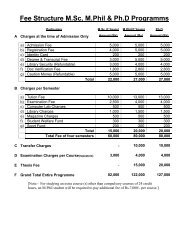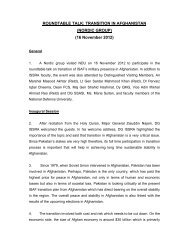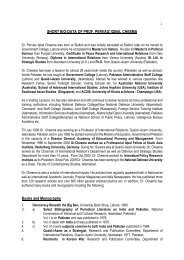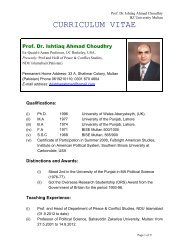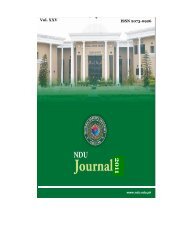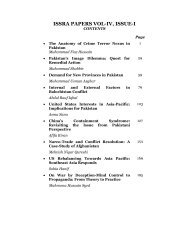OPINION Vol.1, No.1 June 2013 - National Defence University
OPINION Vol.1, No.1 June 2013 - National Defence University
OPINION Vol.1, No.1 June 2013 - National Defence University
Create successful ePaper yourself
Turn your PDF publications into a flip-book with our unique Google optimized e-Paper software.
ecologically sensitive species 31 as well as increased risk of occurrence of severe cyclones and<br />
storm surges 32 . Lastly, the change in the ocean climate patterns has caused rise in the cyclonic<br />
storm activity in the Arabian Sea 33 , having devastating impact on the coastal areas of Sind and<br />
Balochistan.<br />
Key Strategic Factors in Demography and Climate Change of Pakistan<br />
Urbanization. Urbanization is a common factor from both demography and Climate Change<br />
perspective, prime reasons are:-<br />
Demography. There are not enough agri-related jobs in rural areas to employ the swelling<br />
population. Urban areas offer better opportunities to educated youth with a comparatively easy<br />
going life which is free of agriculture related inherent risks.<br />
Climate Change. The frequency of natural calamities greatly increases risk of agro output.<br />
Diminishing water resource will add to the difficulties of agriculture as a profession.<br />
Conclusion. Regardless of the causes, urbanization is likely to continue, so much so that by 2030,<br />
50% of the Pakistani population is expected to be urbanized, putting more pressure particularly on<br />
the megacities. However, in the absence of economic growth, these mega cities in turn will parent<br />
a host of other administrative nightmares, making the urban population extremely vulnerable to<br />
exploitation and casting a direct shadow on national security, including engagement of Armed<br />
forces and Law Enforcing Agencies into internal security situations.<br />
Water and Food Security. The confluence of demography and Climate Change affects food and<br />
water security of future generations in a big way.<br />
Demography. Increasing population requires greater number of people to be fed, putting more<br />
stress on available agri-land. Domestic water consumption for urban and rural population is likely<br />
to increase. Growing population would need more housing space, occupying vital agriculture<br />
utility space and even water.<br />
Climate Change. The water related calamities of last three monsoon seasons destroyed crops over<br />
a large area and affected around 20 million people mostly from rural areas. The loss in agriculture<br />
sector alone was estimated more than US$ 3 billion, while the accumulative losses were around 10<br />
billion US $, wiping out 0.5% of GDP and deeply affecting growth.<br />
Conclusion. The mutually complementing effects of demography and Climate Change on food<br />
and water security will be enormous, directly impacting our national security, in the form of inter<br />
provincial friction on the sharing of resources.<br />
Energy Security. Energy sector in Pakistan is under increasing stress, the effects of demography<br />
and Climate Change on energy sector include:-<br />
Demography. Energy consumption is expected to rise to 129 million TOEs by 2030. Major<br />
reasons included improving life-styles, inherent to developing economies, which requires more<br />
energy; increasing population, which is a major contributor to increased energy needs; and per<br />
capita energy consumption in urban areas (upto 80% more than rural areas), which is going to put<br />
more demand on scarce energy resources.<br />
Climate Change. From the Climate Change perspective, energy security will be affected due to<br />
extreme oscillation in water flow pattern in the rivers that will grossly undermine reliability of<br />
hydro-power generation; global criticism on thermal power particularly coal based generation; and<br />
non-availability of natural gas in requisite quantum (preferred being least on Green House Gases<br />
emissions). The cost of energy production will therefore become prohibitive.<br />
Conclusion. The conflicting exigencies of demography and Climate Change put the energy sector<br />
in a binary stretch like situation. Resultantly, energy security in the future will come under threat.<br />
The obvious fallouts will have direct bearing on the socio-economic development and security<br />
needs of the country.<br />
Disaster Management. Since recent past Pakistan is faced with enormous impact of natural<br />
calamities / disasters, climate change and demography have a close interplay in the magnitude of the<br />
disasters:<br />
<strong>OPINION</strong> <strong>Vol.1</strong> <strong>No.1</strong> 98 <strong>June</strong> <strong>2013</strong>


